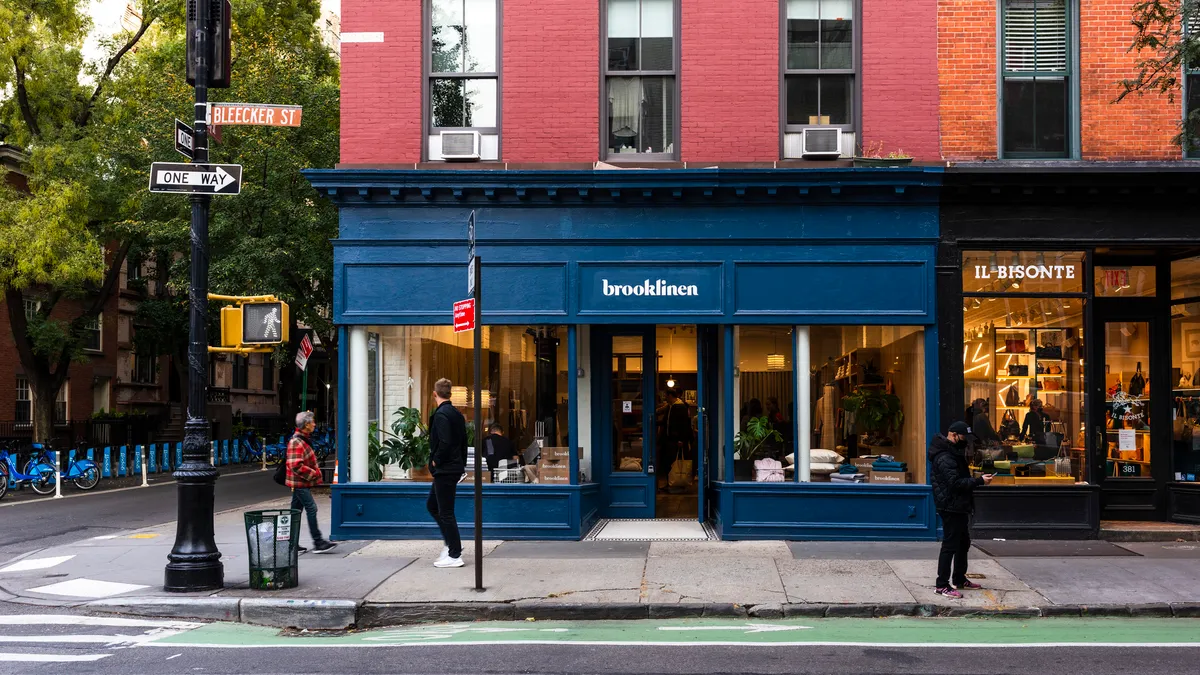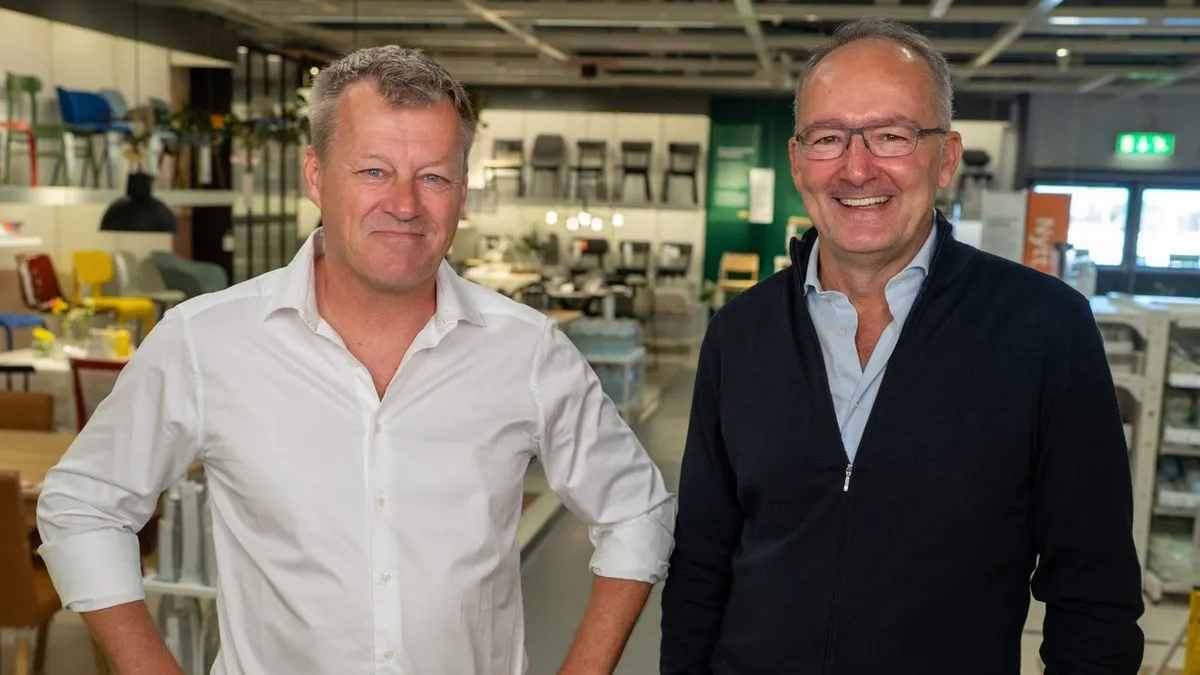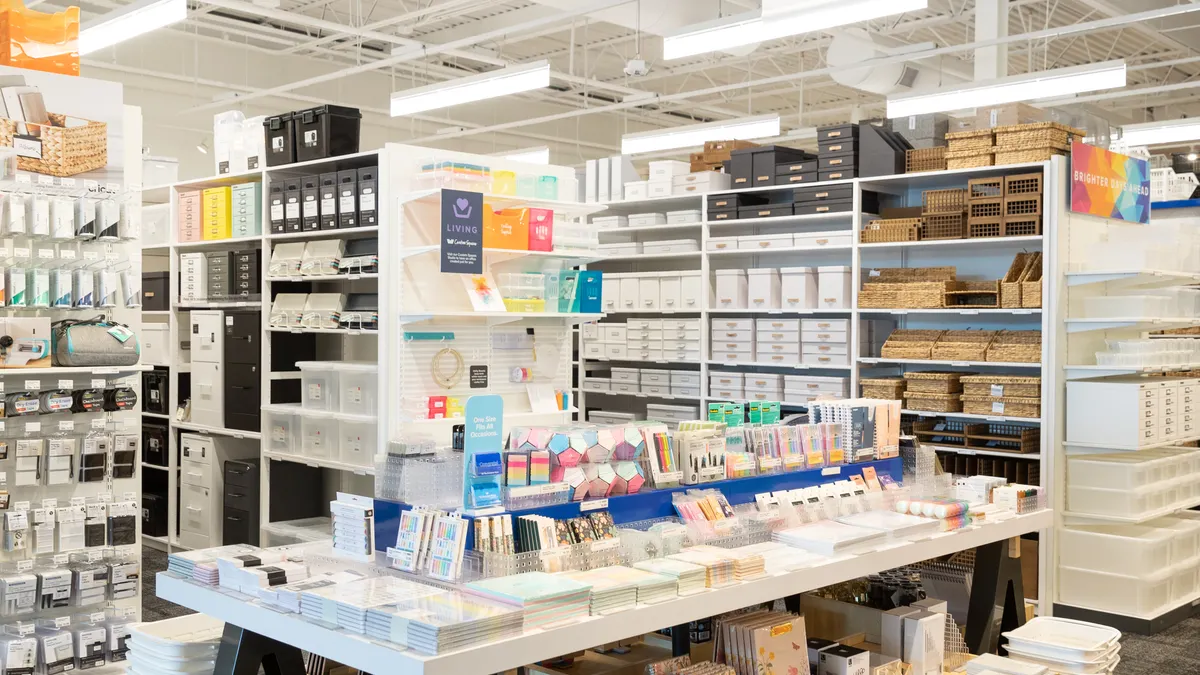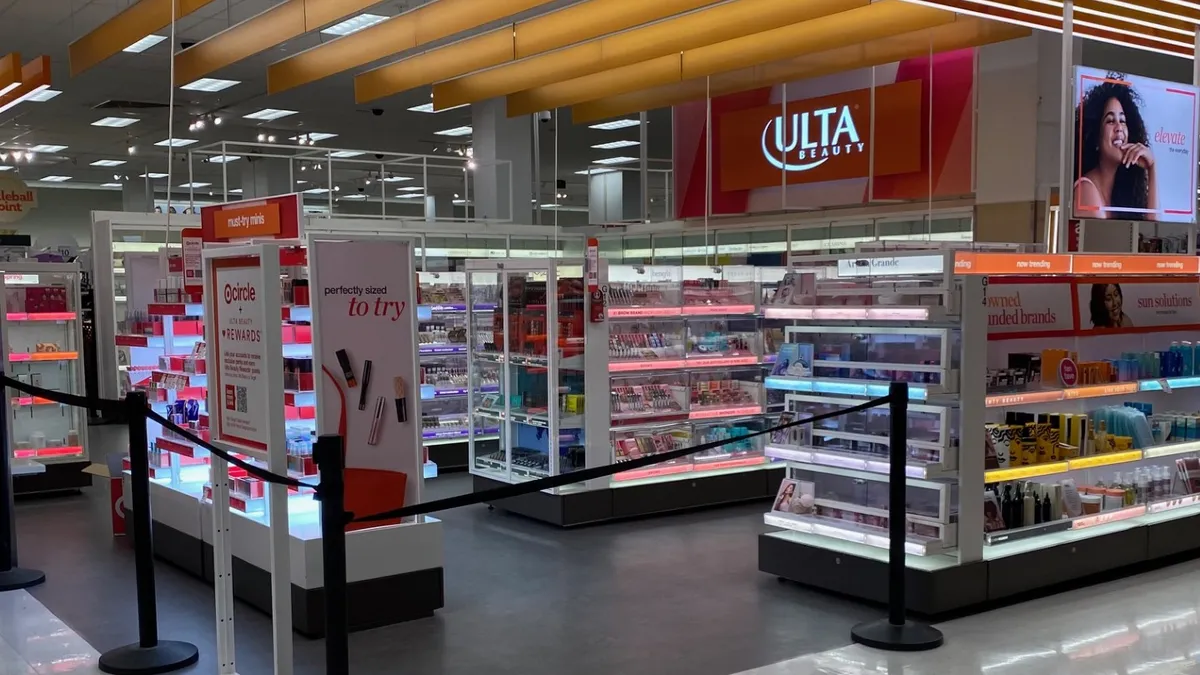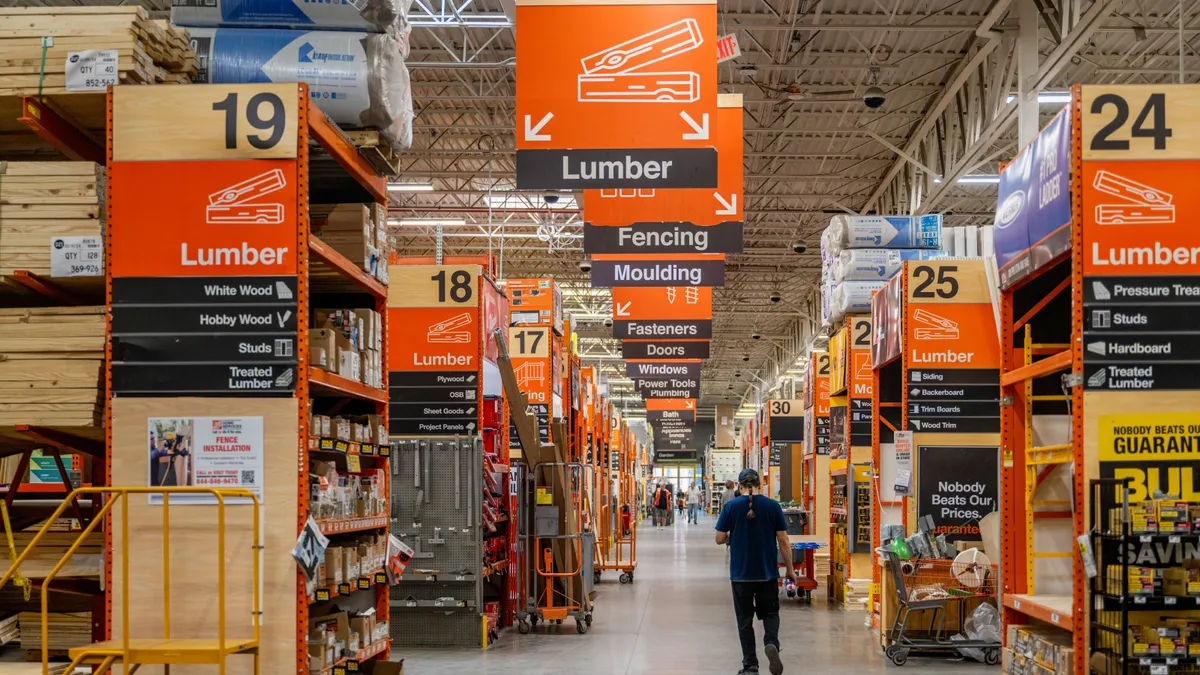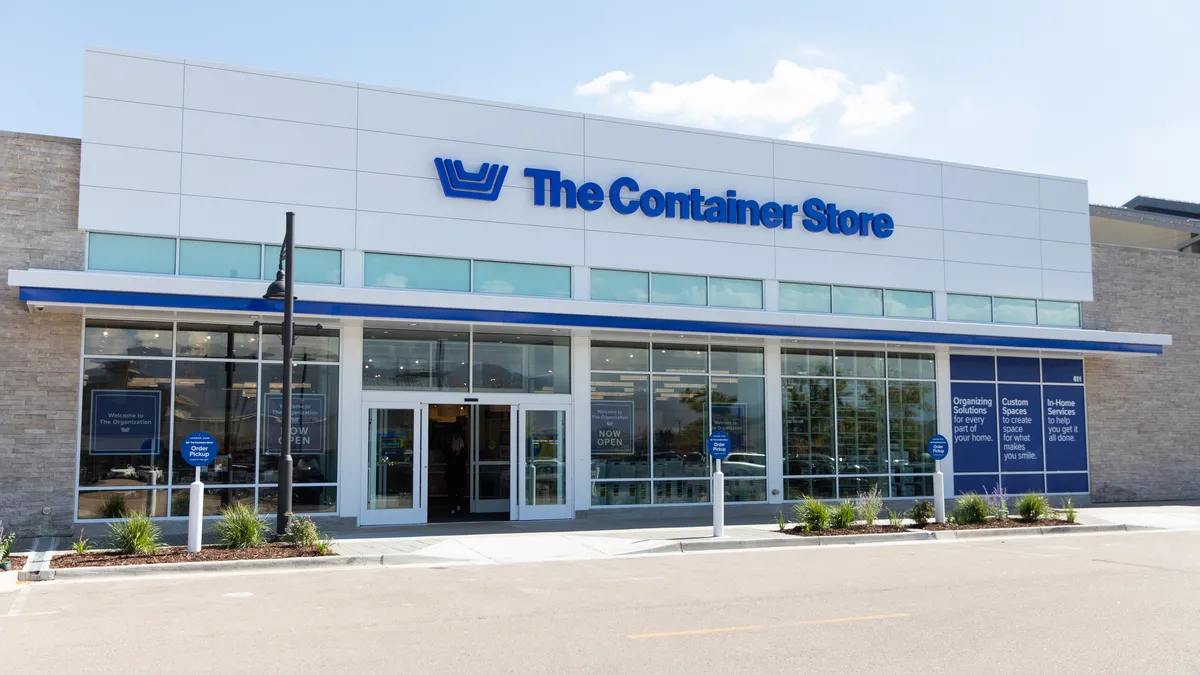After first testing physical retail a few years ago, Brooklinen is looking to triple its brick-and-mortar footprint in 2022.
The DTC bedding brand initially opened a pop-up store in 2018 in New York City's SoHo neighborhood.
"The pop-up was a huge success. We had a lot of learnings about location, where we were in SoHo versus other locations, [and] just gathering a lot of feedback," CEO Rich Fulop told Retail Dive in an interview. "It was pretty obvious after our pop-up that this business needed a brick-and-mortar presence."
From a foot traffic perspective, Fulop doesn't believe the SoHo store "could have done any better." But the brand found that a lot of individuals visiting the store were "window shoppers" and tourists, consumers generally uninterested in purchasing goods for the home. When the brand began to plot its next stores, it considered more residential areas rather than areas that would simply deliver a lot of foot traffic. "It's the quality of traffic," Fulop said.
Brooklinen opened its first permanent store in January 2020, just before the pandemic forced many businesses to temporarily close their doors. But Fulop says that ended up playing in the brand's favor.
"We were actually really fortunate because we were just starting our physical store adventure at that point. We only had one store, so we didn't have a lot of exposure," he said. "As a percentage of our revenue, it was tiny — it literally just opened 60 days before it closed. Because of that we didn't have a lot of exposure."
The retailer had also just come off a "breakout" year for the business and had ordered a lot of inventory in preparation for 2020. When the pandemic took hold and disrupted supply chains, Brooklinen was well-positioned to benefit as consumers sought out home goods.
"While others experienced stockout, we were able to step on the gas in our marketing channels because we had a lot of inventory," Fulop said.
He added that during that period early in the pandemic, the brand never had to furlough any employees, instead finding other jobs within the company for those affected by the store closure. The store reopened for curbside pickup orders in July 2020, and the brand now operates two permanent locations — one in Brooklyn and the other in the West Village in New York.
Now, Brooklinen aims to triple its brick-and-mortar footprint, adding stores to Los Angeles, Philadelphia, Portland and San Francisco. But it won't stop there: By 2024, the brand aims to operate between 25 and 30 stores, doubling its retail presence next year and again in 2024.
Over the years, many DTC brands have turned to physical retail as a way to offset the high marketing costs associated with customer acquisition, which for many brands, has come at the expense of profitability. And while that sentiment remains key for Brooklinen, Fulop says the brand has always been profitable.
"We don't believe in showrooming or the concept of a flagship store that might be a loss leader. All our stores do and will make money," Fulop said. "Having bootstrapped this business with our own savings, profitability has been key since day one. As we expanded the business through a multitude of channels and products, it's still true to our core that we do run a profitable business."
Brooklinen's physical retail stores experienced 227% year-over-year net sales growth in 2021, and the brand aims for the channel to eventually represent about 50% of overall sales.
Expanding its business
When Fulop and his wife, Vicki, launched Brooklinen in 2014, their goal was to provide sheets with exceptional quality that didn't come with a sky-high price tag.
In the years since, the brand has expanded beyond sheets to bath products like towels, robes and shower curtains, as well as loungewear. Brooklinen in 2019 also launched an online marketplace dubbed "Spaces," which featured products from partners like furniture brand Floyd, plant brand The Sill and publishing company Taschen. And in October, the company introduced a new brand, Marlow, dedicated to pillows.
"From a brand perspective, I really think you have to know what you're good at and know what is the most critical part of the brand. Our calling card, our hero products that most people hear about for the first time are our sheets," Fulop said, adding that by launching a separate brand for pillows, the company is able to really focus on developing that product rather than having it be an extension of an existing brand. "We use our internal resources — from distribution, supply chain, marketing — that's all done in house with the same team. Except now we have dedicated advertising that can go behind this one brand with this one product and it's pretty much all it does. Whereas with Brooklinen, it would be another one in our catalog — maybe the fourth or fifth product you'd explore."
Its a move reminiscent of DTC holding companies, where one company will house several brands under its umbrella, providing a shared team of resources to help drive growth at the individual brands.
In Brooklinen's next pursuit, however, the company is refocusing on the product it's become known for: sheets.
The company on Tuesday announced it launched its first hospitality collection, Brooklinen for Business. The collection takes inspiration from some of the brand's most popular products, including The Chill and The Snuggle Sheets and The Wrap towel.
"The needs are very, very different in terms of wrinkle-free, whether it can stand up to bleaching or some harsh laundering … so the engineering behind that, in order to optimize those, needed to be totally different from our main line," Fulop said.
The company's hospitality business, which features clients like boutique hotels and bed and breakfasts across 46 states and 10 countries, has doubled in size over the last three years.
The Brooklinen for Business collection will roll out throughout April with more offerings to come, according to the company.



